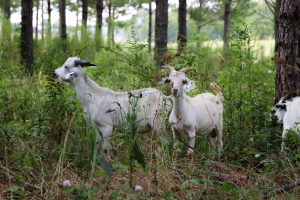
By Tanner Hood
AUBURN UNIVERSITY, Ala.—Alabama is known for its robust and diverse agricultural production. From beef cattle to cotton, Alabamians play a significant role in the agricultural industry. However, most people do not think of meat goats when they think about Alabama agriculture.
Alabama Meat Goat Production
The meat goat industry is a growing aspect of agriculture in Alabama. Valens Niyigena, an Alabama Cooperative Extension System animal sciences and forages specialist, said the meat goat industry is booming.
“The meat goat inventory for Alabama in 2021 totaled 47,000, a 2 percent increase from the year before,” Niyigena said. “The U.S. spent $133.82 million in December of 2021 on frozen, fresh and chilled sheep and goat meat. This was a 44 percent increase from December of 2020.”
Increase in Demand
Goat meat is a staple of many foreign cultures in places like Africa, Latin America and Spain. With numbers of immigrants from those countries increasing, goat meat is becoming more popular in the U.S.
Likewise, during the coronavirus lockdown many people began raising goats to stay busy at home. As a result, the demand for meat goat breeding stock has increased tremendously in the last two years.
Other Purposes
Meat goats serve other purposes as well.
“Currently, Alabama has the third highest timberland acreage of the 48 contiguous states,” Niyigena said. “Goats are used to clear the understory vegetation of woodlands instead of non-ecologically friendly methods such as controlled burning or herbicides.”
Many goat farmers in Alabama also raise goats with other livestock species on the same pastures to optimize forages utilization and weed control.
Age Gap Problems
However, the average age of goat farmers in the U.S. is 55 years old. A major concern for people like Niyigena is the decline of future industry due to the age of the farmers.
Niyigena said young people are encouraged to enter the goat industry because it is much simpler and less time consuming than raising larger livestock like cattle. This is a multi-species grazing system.
Things to Consider
There are a few aspects of goat farming that new and experienced farmers need to know and handle before producing exceptional livestock:
- Resources. Are forage and water available for the livestock?
- Infrastructure. Building effective fences barns for keeping livestock safe.
- Predators. What threats do livestock face and how are they controlled?
- What kind of goats to buy. Which goat is the best option for each operation?
- Where to buy goats. Do certain producers have a history of sickness in their livestock?
- Research. Determine the best types of goats, sicknesses, feeding options, and biosecurity measures before beginning production.
- Budget. A keen awareness of costs can save money in the future.
Seeking Assistance
Producing the best livestock is important to every farmer. Farmers should contact the local Farm Service Agency and Natural Resources Conservation Service offices to determine available resources for their land. Niyigena also said farmers should contact their local Extension agent to provide recommendations before beginning. Agents can help novice goat producers to double check that research and operations are handled correctly.
More Information
For more information about meat goat production, visit aces.edu.

















